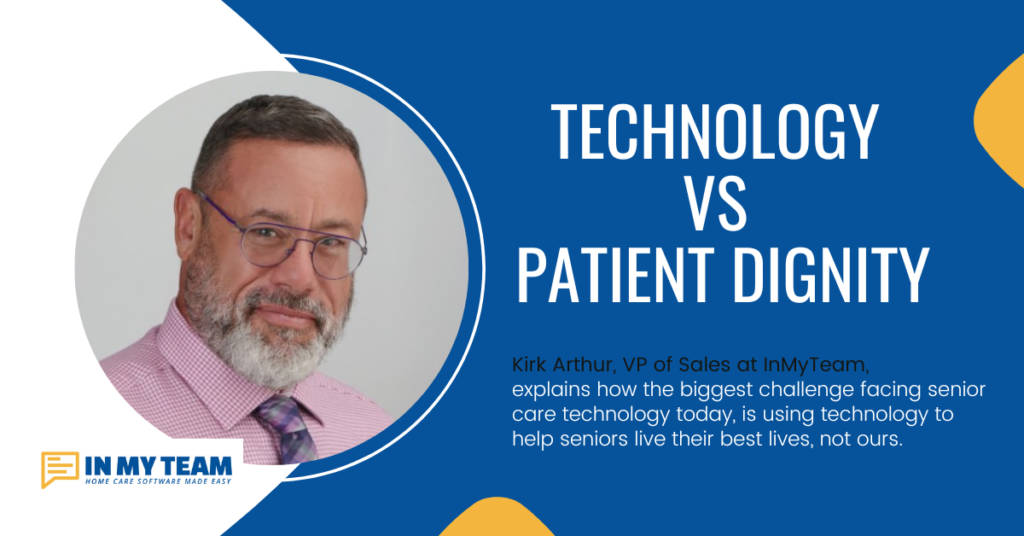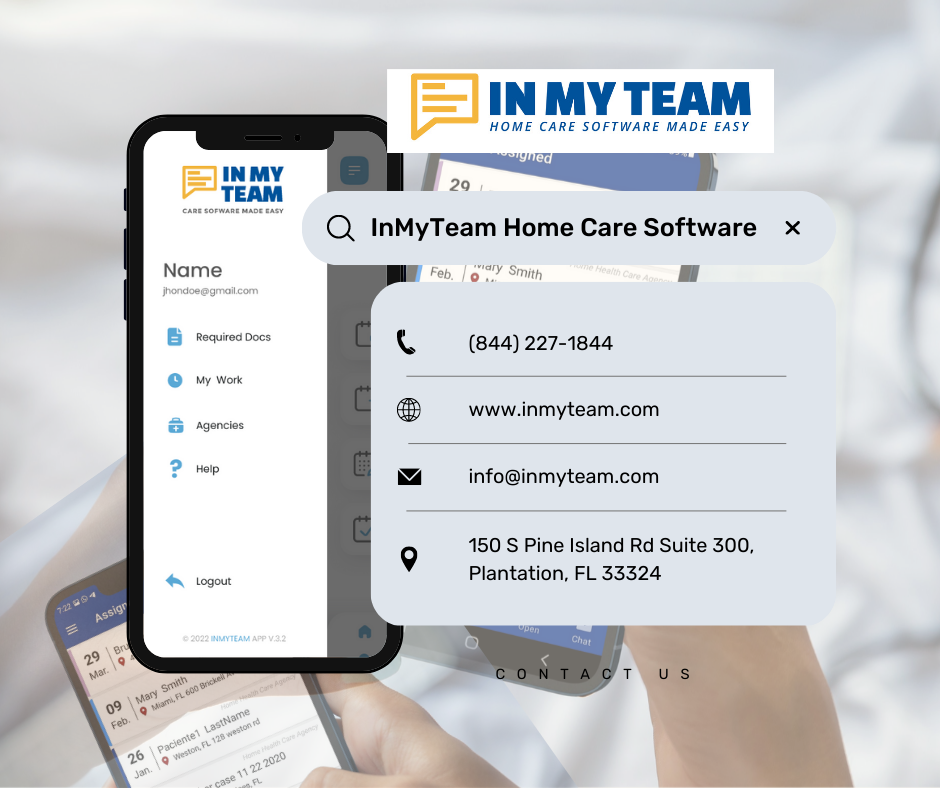In this article, Kirk Arthur, VP of Sales at InMyTeam, explains the biggest challenge facing senior care technology today: using technology to help seniors live their best lives, not ours.
Technology VS Patient Dignity
“Currently we are living in an era where “The Internet of Things” is in full swing. Everything from refrigerators to watches to personal assistants have the ability to interact with users. These advances can make life easier, reduce stress of caregivers and working families and improve health outcomes. We still don’t know the full effect of artificial intelligence like ChatGPT, but already we can see how it will change how we interact with technology. Today healthcare technology companies are considering incorporating AI into its abilities to document care. However when we start to automate and streamline tasks with technology there are possible downsides such as how tech tools that make life easier for the caregiver, may in fact be detrimental to the individuals being cared for.
Let’s get started with one definition of dignity according to the Miriam Webster Dictionary: the quality or state of being worthy, honored, or esteemed. According to the Social Care Institute for Excellence, Dignity in care means providing care that supports the self-respect of the person, recognizing their capacities and ambitions, and does nothing to undermine it. I like this definition because it can easily be juxtaposed with advances in technology in regards to those who care for patients, in particular those who care for the elderly. “
Efficiency vs. Dignity
Sometimes the most subtle technological changes, things that seem harmless, can have an unexpected effect. For example, using Alexa or other personal assistants to remind patients to take medications, eat, pay bills, turn lights on and off, are a great tool. However, are we reducing the independence of the seniors? Are we isolating them more, with fewer in person calls and visits because we know that Alexa or Hey Google are going to do that for us? What are the consequences of fewer in person visits? One well known side effect of isolation is depression. The same might be said for telehealth, again, are we making life easier for the patient or the clinician? Who has the responsibility if some important clue is missed in a telehealth visit? I am also assuming that seniors are capable of using teleconferencing tools such as Zoom and phone apps. I am often challenged by having to learn new apps for video conferencing. Using dignity as a lens, how can we be sure a senior is in a confidential setting in a video call? How can a caregiver be sure something as simple as volume on a device isn’t broadcasting to another person in an apartment next door?
We are busy people, how can we as caregivers of our patients make sure we are using technology to improve their lives and not just make life easier for us? I use my digital assistant. I have mine set up to remind me to water the plants, reorder dog food and turn all the lights and electronics off or on. For seniors they can be used as reminders to take medications, to eat, to sleep and to adjust the temperature on the A/C or heater. They can even turn on or turn off appliances. I don’t have to call mom to ask her if she took her meds, Alexa does it every day at 7PM! Efficient? Yes. Does it promote mom’s dignity? Maybe, maybe not. Ideally, we want our elderly to retain as much autonomy as long as possible. With that in mind, when we add a seemingly “harmless” tool, are we considering the dignity of the client? I would encourage an ongoing dialogue about this.
Privacy Vs. Dignity (Data, Data Everywhere!)
FitBits and smart watches are fantastic tools for patients and caregivers alike. If you’re caring for a frail adult, who wouldn’t want to know how many steps mom took today? Home Care Agencies can log in to different tools to see patients’ heart rate, sleep quality and movement. Smart C-Pap machines can broadcast data about sleep apnea as well as inform users (and agencies) that they might need to be cleaned or replaced at certain intervals, all this makes monitoring and caring for a patient in the activities of daily living easier. But what is the trade off? The Internet of Things also broadcast that data to places unknown. Do I want strangers knowing when I sleep? Or when I’m exercising outside the house? Many of these devices actively broadcast the location of the user continuously. While that may be nice for the caregivers, is it the safest or most dignified way to make sure your loved one or patient is doing well? Or is it just convenient to know that mom got out of bed that day? Isn’t privacy at least one component of dignity? Do you remember your parents banging on the bathroom door and asking what you were doing in there? A constant dialogue with seniors about what level of privacy they need vs. our need to care for them? Obviously this is a moving target, but requires an ongoing dialogue as more and more people choose to “age in place”.
Measuring Technology through the lens of Dignity
I agree that all this technology is great. I do call my mom through my Alexa assistant to the one I set up in her kitchen. To me it’s the equivalent of yelling at her from my bedroom, even though she’s 200 miles away. I’d like to know that she’s exercising, getting out of bed, getting out of the house, filling the fridge. Today technology exists to do all of these things. It’s real. The question we need to ask ourselves is whether it keeps our seniors independent, keeps them thinking about their own care, motivates them to make their own decisions, and ensures that they can do the activities of daily living as independently as possible for as long as possible. Or are we introducing this technology just to make our own lives easier. Would you put off a check in to a client if her smartwatch told you she was out and about?
As technology advances, tools like ChatGPT and AI will further enhance our lives and at the same time create dependencies that we never expected. Have you ever taken a phone away from a teen? Imagine that teen after 80 years of continuous connectivity? Will different techs be in conflict with each other and the seniors about exercise, food choices, and personal spending? Today these conflicts are resolved by the caregivers, but soon technology could have a say in what grandma should do today. It’s important to be sure that the individual is the focus of care and not the caregivers’ or institutional needs to be efficient and profitable. Making sure dignity is part of the care plan.
If this article was useful for you, don’t forget to share!





